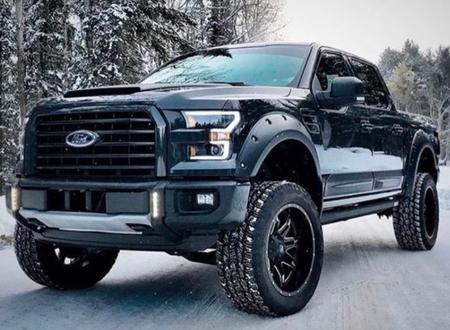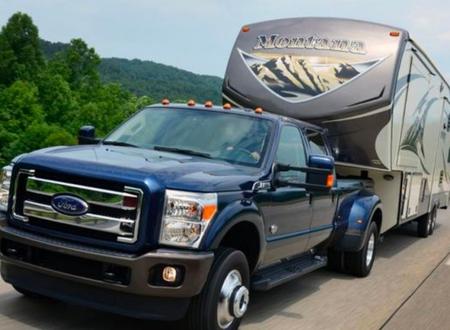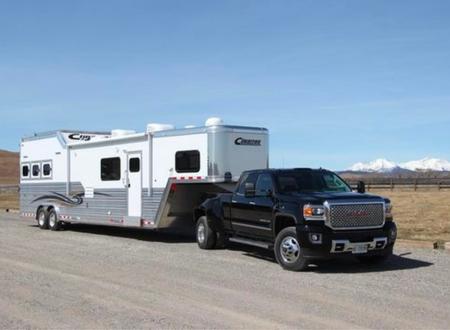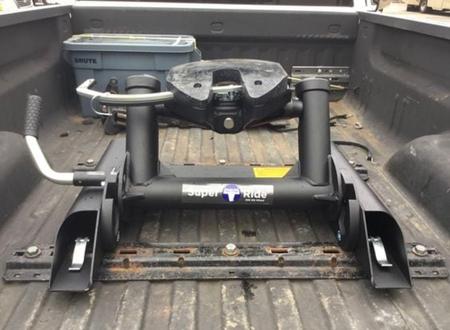How to Choose a Truck to Pull Your 5th Wheel
How to Choose a Truck to Pull Your 5th Wheel
You’ve already selected your desired fifth wheel for your next trip. The next step that comes, and one that can be pretty daunting, is selecting a truck to pull your fifth wheel.
Before you finalize your purchase of a fifth wheel, it’s essential to know the kind of truck that would be most suitable for the model you are considering. To pick the right truck, here’s what you need to know:
1. What Kind of Truck Do You Need?

Towing a fifth wheel is not as easy as it sounds and requires a large truck to pull it. Typically, a fifth wheel weighs around 12,000-15,000 pounds and hitches differently than a travel trailer. However, their weights range from 2,400-20,000 pounds. It hitches into the truck’s bed between the rear axle and the cab. Therefore, there’s no pivot point, but the weight is dispersed all through the truck.
What makes a truck a great choice for a fifth wheel is for it to have high payload and high towing capacity. An example of this is Ford trucks. While doing your research, you’ll notice that as the cab gets bigger, both the towing capacity and the payload decrease. However, you should ensure that your chosen truck has a big enough cab, yet provides high towing capacity and payload.
The next thing to consider is whether you need a dual rear wheel truck for pulling your rig. If you’re hauling a rig that weighs over 20,000 pounds, you don’t really need a dual rear wheel truck. Similarly, 4×4 trucks have relatively lower payload and towing capacities, so such a vehicle is not really needed unless you want the capabilities of a 4×4 when the truck isn’t hitched.
Another essential factor you must not ignore is the gear ratio. Certain ratios drastically increase the towing capacity while others bring the towing capacity down by at least a thousand pounds.
What’s important to note is that if the gear ratio is higher, the towing capacity will be higher, as well. To be clear, gear ratio refers to the rear axle of the truck. So for instance, if the gear ratio is 2.55:1, then it means that when the truck’s wheel turns once, the drive shaft turns 2.55 times.
2. Truck Size: Does it Matter?

Short answer yes! The truck size is of great importance. To pick the correct size, you must know four things.
First, you must know the maximum load weight of the fifth wheel that you want to tow. You’ll find this in the specifications of the fifth wheel and it will be mentioned as GVWR (Gross Vehicle Weight Rating).
Secondly, you must know the hitch weight or pin weight of your vehicle. Again, you’ll find this in your vehicle’s specs. The third thing to know is the truck’s maximum towing capacity, which will also be mentioned in the truck’s specs.
Finally, find the truck’s maximum payload capacity in the specifications of the truck. The payload refers to the maximum amount of weight that a truck can safely carry on the axles.
Knowing all four of these is essential because if you exceed the truck’s towing capacity, you’ll put an additional strain not only on the engine but on the brakes and transmission, too. So, while pulling your fifth wheel, the truck won’t be able to perform well, and on steep inclines, the engine can overheat. In addition, it might be slow to accelerate when you come across traffic while merging from an interstate.
Not to mention, driving and navigating an overloaded truck can be stressful, and in case of an accident, the fact that your truck was overloaded can affect the insurance. Many people think of the truck’s towing capacity as the most critical; however, the payload is actually most important. Your truck’s payload capacity should be such that it can easily handle not only the weight of the fifth wheel’s hitch pin but also the weight of the items and people in the truck.
3. Gas or Diesel, Which is Better?

If you’re buying a truck only for pulling your fifth wheel, it’s better to invest in a diesel engine, as surprising as it may sound. Of course, regular gas costs less than diesel per gallon; however, there’s a great difference between the two fuels. Think about it, if you’re pulling the fifth wheel along with you, chances are that you plan on traveling a long distance with it.
Therefore, when it comes to fuel economy, diesel is a much better option than gas. In fact, comparing diesel and gas engines shows that the former gives 25 to 35% better fuel economy.
Moreover, given the way diesel is burned, it creates more torque than gas engines. Therefore, a diesel engine gives you the capability of towing heavier things. Also, you won’t have to take diesel engines for maintenance or repairs as soon as you’ll have to take a gas counterpart. They also tend to last for a longer time, saving money in the long run.
Modern technology also favors diesel engines, with diesel cars outperforming those with gas engines in several ways. For instance, the former provides not only a better fuel economy but also long driving distances. So, if you’re planning on traveling with your fifth wheel and will be staying on the road for some time, the best option is diesel. While gas looks cheaper upfront, it’s better to think long-term and factor in the maintenance and repair costs that gas engines frequently need.
4. Long Bed or Short Bed?

Almost everyone would benefit from a long bed truck for their fifth wheel and there are several reasons for that. For instance, short bed trucks need a special hitch for a fifth wheel because of the lowered turning radius.
The decreased turning radius can also cause the front of your fifth wheel to hit the cab of the truck. Therefore, a long bed, measuring eight inches to be precise, is your best option because you need some space in the front of the hitch for the trailer. In turn, this will clear the cab’s back window of the truck.
Moreover, there’s a high chance you’d like to install a trunk in the truck’s bed to get some extra storage. That is hardly a problem with a truck with a long bed, but it’s not so easy with a short bed.
Lastly, while you can use a short bed truck for your fifth wheel, you’ll need to take additional measures to secure your trailer. Keeping in mind all these, it’s clear that a long bed is your best option. Also, note that the longest bed you can get is around eight feet long.
Conclusion
To get the smoothest experience on your next trip, it’s not only essential to carefully pick the fifth wheel. The truck for towing your trailer also demands equal consideration. Therefore, consider all factors, especially the towing capacity and bed size, before finalizing your pick.

Hello, fellow wanderers! I’m Alyssia. Since 2008, my husband and I have called an RV our home, journeying through life one mile at a time. Our nomadic lifestyle has led us to over 70 countries, each with their unique tales that have shaped our own.
I share our stories and insights right here, hoping to inspire and guide you in your own adventures. Expect tips on RV living, our favorite camping spots, breathtaking hiking trails, and the joys and challenges of an ever-changing view from our window. Alongside, you’ll also find practical advice on outdoorsy stuff, designed to equip you for any journey. Join us as we continue to explore the vast, beautiful world on wheels!